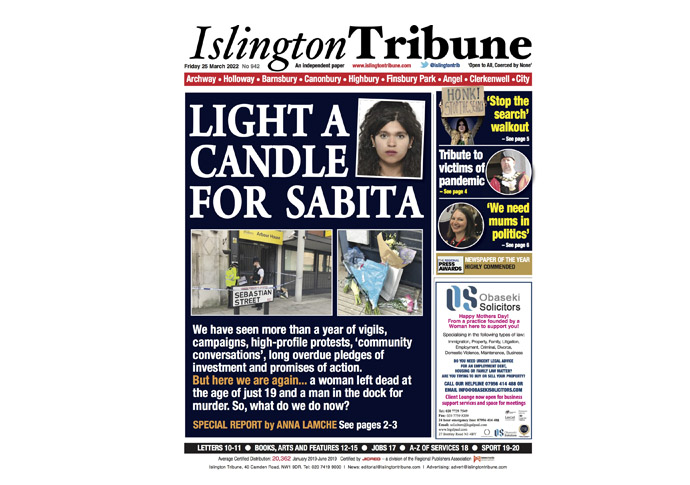Islington Tribune’s 10-point charter to end the violence
Plan follows suggestions from VAWG summit
Friday, 29th April 2022

After the death of Sabita Thanwani, we asked how could we end the sickening feeling of déjà vu and the countless cases of violent attacks. ‘What do we do now?’, was the question. It wasn’t rhetorical – we wanted answers from those with the power to make a difference. Our summit and this charter aims to play our part in tackling the problem
THE Tribune did not organise this week’s VAWG summit for people to come and say wise words and then leave it there.
We all want to try new ideas that may meet this epidemic head-on.
That’s why we have compiled a 10-point charter for change, born out of the suggestions from our panellists on Tuesday evening.
We can’t be writing the same tragic stories on a cycle – and that’s why we will be pushing to see these measures become a reality and then check how much progress has been made.
• Create a one-stop shop for information: Police, council and third-sector organisations work together to produce a platform where those experiencing violence can find all the legislation, resources and community projects available to them in one place.
• Encourage schools to take part in consistent workshops: the council is to tackle the reluctance of some schools to work with The Sunflower Project, an Islington-based initiative working with young people to tackle misogyny through lessons on women’s rights, respect and equality specifically aimed at young boys.
• MEWSo to distribute information and training on the Domestic Abuse Bill and the Domestic Abuse Commissioner’s “Safety Before Status” recommendations to the council, police, third-sector organisations and public, in the form of workshops and information packs; these resources should be available in different languages.
• Expand on a council communication campaign focused on men’s accountability and recognising forms of violence against women and girls, learning from a similar campaign run by Solace in Essex.
• Establish regular meetings between police, local activists and community groups on top of “walk and talks” with local residents.
• Work with community ambassadors to produce a VAWG campaign, potentially working with Arsenal FC to form a “stand up to violence against women” movement.
• Police actions:
1) develop robust procedures for breaches of bail and non-molestation orders from sexual offenders;
2) committing to proactive investigations, contacting work places, door-knocking and taking witness statements;
3) allegations against police officers must be taken seriously and met with zero-tolerance disciplinary action.
• Increase the number of female staff in the local police force (the figure currently stands at around 34 per cent of officers) by introducing job sharing, flexible working policies and clear leadership pathways.
• Develop positive police presence in schools: build trust between young people and police either via a permanent school police officer stationed within a school, or regular visits from the local police force from primary school age.
• Council to deliver a “bystander training” programme teaching men to recognise when someone is being harassed or abused and how to intervene safely. This training will be rolled out across Islington with a particular focus on reaching men from marginalised communities.